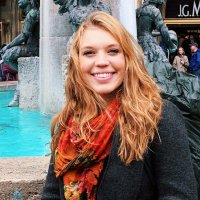
Families don’t always get the chance to give back to the hospital staff and researchers that save their loved ones’ lives. But Aurelia Reynolds '21 got just this chance when she was offered a research position at the world-famous Dana-Farber Cancer Institute, and she’s grateful for it every day.
“My mom was diagnosed with breast cancer when I was just 8 years old,” Aurelia said. “I watched her undergo a double mastectomy, plus chemo and radiation therapy. It was a hugely traumatizing experience but I was so grateful for the healthcare professionals at Dana-Farber who helped her get better. My family and those of other cancer patients would routinely bring food and treats to the institute to share with patients and their families. It was a supportive community and I never dreamed that I’d get to give back by working there someday.”
Aurelia’s mother recovered, and Aurelia is now a research technician in a wet lab at Dana-Farber, where her work benefits many other cancer patients who depend on her lab’s findings to shape and inform life-saving cancer treatments. She credits the four years that she spent in the iCons program at UMass Amherst with helping her prepare for this experience, as she learned how to push past her comfort zone to patiently work on problems without easy solutions.
“The iCons program taught me that you have to sit with the discomfort and vulnerability of doing science in order to do good science. We don’t always have all the answers but we keep working until we find them one by one.”
The painstaking research that Aurelia undertakes in the wet lab — a research facility where genetic material, drugs, chemicals, and other matter can be analyzed and tested over and over again using various liquids — is hard work but rewarding. Thanks to this kind of persistence, cancer research has come a long way since Aurelia’s mother was diagnosed.
“When my mom was in treatment, the genetic testing she received was only focused on the BRCA1 and 2 genes at the time. Now I’m working with a panel that has over 400 identified cancer genes. It’s amazing how far we’ve come in a short amount of time.”
Aurelia was a biochemistry & molecular biology major at UMass, but her first brush with intense research came via her first-year iCons project when she was tasked with creating a model to show how a beehive colony can die after exposure to a virus or bacteria, often called colony collapse disorder.
![]() The research project is a classic assignment for iCons students due to the enormous, real-world impact of declining bee colonies on agriculture and human health, and because good solutions require creativity and close collaboration. iCons research teams are made up of students with various science, engineering, and business backgrounds who come together to share ideas, explore solutions, and then present their findings.
The research project is a classic assignment for iCons students due to the enormous, real-world impact of declining bee colonies on agriculture and human health, and because good solutions require creativity and close collaboration. iCons research teams are made up of students with various science, engineering, and business backgrounds who come together to share ideas, explore solutions, and then present their findings.
Students quickly discover that they have to work together and communicate well to solve their research problems. Many also discover a passion for applying their work and research to address public policy and public health situations. These are values that stick with them even after they’ve graduated and moved on from the university.
“iCons was a vital piece of my education at UMass, and made me a well-rounded student and scientist,” says Aurelia. “The most inspiring aspect of the program is other students and the passion and excitement they all shared for their work together. I feel like we all got a better education than our science peers, and it was due to the many skills we learned while in iCons.”
Aurelia loves her job at Dana-Farber and enjoys knowing that she can continue to apply the skills she learned in iCons more directly to improve people’s lives. She may also apply to medical school or pursue a Ph.D. in science someday.
“I believe that to change the world, you need to be able to communicate science and educate people so that they can make good decisions. I’m excited to give back as much as I can, and I’m so grateful that I get to share that excitement with my healthy mom all the time.”
Stay Connected